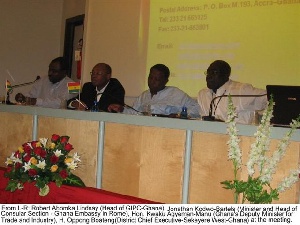A National Conference of Ghanaians in Italy has been held in Italy’s first capital, the city Torino.
The two-day event was focused on Investments in Ghana for the Ghanaian community in Italy and Italian entrepreneurs who wants to invest in the country.
A delegation from Ghana to the meeting was led by Hon. Kwaku Agyeman-Manu, Ghana’s Deputy Minister for Trade and Industry. Other members of his team were, Robert Ahomka Lindsay - Chief Executive Officer of Ghana Investment Promotion Centre (GIPC), Oppong H. Boateng - District Chief Executive of Sekyere West - and two other senior officers, Augustine Otoo and Kofi Addo from the GIPC and the Ministry of Trade and Industry respectively.
Also present were two Diplomatic Officers from the Ghana Embassy in Rome, Jonathan Bartels-Kodwo, Minister and Head of the Consular Section, and James K. Nyasembi, a Minister-Counsellor.
The Conference was chaired by Bartels-Kodwo who before opening it gave a brief remark expressing his gratitude to the Ghana delegation for coming to Italy and also thanked the Council of Ghana Nationals Association in Italy (COGNAI) for their efforts in coming out with the idea of the event in colaboration with its sponsors.
The Chief Executive Officer of the GIPC, Lindsay, gave an extensive information about setting up business investments in Ghana and how Ghanaians abroad and all other investors can invest in Ghana’s economy through the GIPC.
Speaking to over 300 participants present he cautioned them about investing in Ghana through family members or people who claim to have the ‘right connections’ to help them establish business in Ghana. “We at GIPC are capable of handling every aspect of your plans in setting up business when you arrive in Ghana,” he advised as he comprehensively and convincingly made his presentation covering many areas about investing in Ghana. “There are 5 key areas we try to help people establish their business in Ghana,” he said: “One: We initiate and support measures that will make the investment climate better for businesses both domestic and international. We look at taxation, immigration or any other thing that has to do with investment and ensure that the investment climate is good for the investor. Two: We promote investment inside and outside Ghana and we do that by going out (as I’m here) sharing the opportunities with business people around the world and inside Ghana. Three: We are taxed to collate, analyse and bring together all trends and analysis to show the performance of our investment community in Ghana with the point to helping them register with GIPC, to ensure that the climate and whatever we are doing meet the needs of our economy.
Four: We also spend a lot of time on the centres so that day to day centres that we have as a country is managed by the centres and not by the Ministry – we encourage you when you come to Ghana to visit the Ministers but investment processing is not done by the Ministries. Ministries do the strategy and policy, we at GIPC execute the policy and strategy.
Five: We are there to hold your hand as you think about investing in Ghana, when you invest in Ghana and after you’ve invested. The way we do that our mandate covers everything from giving you permit to operate in Ghana and if there are tax incentives we are the agency that gives you those incentives because we work closely with the Customs and Excise”, he told them.
The GIPC Chief also explained to the participants, which included some Italian entrepreneurs, a wide range of investment opportunities such as crop production, poultry production - under Agriculture, livestock feeds and fishmeal, packaging -under Agro Processing, Agri-Business, naming provision of services, agricultural estates, irrigation and storage facilities. Hotels coach services, car rentals, beach, lake resort developments as examples of Tourism. Also mentioned in his presentation are, Information & Communication Technolgy (ICT) under which he talked about production of electrical and electronic products, manufacture and assembly of computer equipment and legal database adding services like tranportation, financial, health and education.
Robert Lindsay also gave the participants reasons why they should locate their business in Ghana. “Ghana is among the 10 reforming countries in the world and the first in Africa (Doing Business in 2008 – World Report),” he pointed out, adding the country also has increase revenue, reduced inflation, reduced interest rate and political stability having multiparty democracy since 1993.
In the concluding part of his presentation, he mentioned that Registration of business in Ghana through GIPC can be done in a day of which Registration Certificate is issued after 5 days. The Chief Executive Officer of GIPC indicated his outfit does not torelate any acts of corruption and if he has any evidence of such mal-practices or its kind it would be dealt with drastically to an extent of the culprit put before court and jailed subsequently if found gullty.
He gave the website of GIPC as: www.gipcghana.com and says within 82 days of arriving in the country the investor can start business.
The Deputy Minister for Trade and Industry on his turn updated the participants on the current economic situation in Ghana urging his compatriots to take advantage of the current boom of doing business in the country to come and invest. “The discovery of petroleum in Ghana, whose benefits will begin when drilling starts in 2010, has among other factors brought many business opportunities in Ghana and you must not wait till 2 years from now because you will be left behind,” he said as he advised the participants, adding that despite the oil find Ghana has learn’t a lot from the Nigerian example and will not allow its other industries to collapse as the government is looking for investments in agriculture among others with some tax concessions. He continued,“There is hope for Ghana and other people outside our country has recognised the massive potential we have. Opportunities are now glare and people are coming to Ghana to invest,” adding: “my Ministry is trying to ensure we have an enviroment within which business can be done easily and smoother without much challenges.” He pointed out that Ghana has managed to prepare its economy to receive foreign investors, from Ghanaians in the diaspora and from Ghanaians who wants to get back home with good investment plans and went on saying the government is supporting agriculture and its subsidiaries under which there is a government fund which can be accessed whilst banks are also giving loans. “We are also looking for partnerships. Those of you living abroad seems much more exposed than those of us in Ghana in terms of technology, which machines you can use for poultry, food processing among others, in terms of how businesses are run, attitude and how to comply with laws. We have moved from things we could not easily dream about 7 years ago and we are getting closer to where we want to be,” said the Hon. Minister.
He reiterated an earlier point that there is no better place to invest in Africa now than Ghana and says Ghana is different because there is peace in the country, is different because it has laws that protects investments, that it has incentives that enables it to attract investments from outside into the country. According to him, whatever money the investor make in Ghana, after paying of taxes, can be transfered outside the country without difficulty.
Presentation was also made by Oppong H. Boateng, the District Chief Executive of Sekyere West. He informed the participants that there is an ungoing land reform projects in Ghana, called ‘Land Association Projects’, where government is trying to acquire large size lands all over the country by paying compensation fees to land owners and they are marked as ‘land banks’ for investors. “The government is also encouraging traditional chiefs to use land as equity shares in whatever investment they go into,” said the Sekyere West District Chief Execuitve.
A representative of International Organisation for Migration (IOM), Tana Anglana, who was also present, presented a report on Financing and Support to Immigrant Workers. She mentioned also the formation of a Women’s Organsiation in West Africa to help in the socio economic development of the region.
Participants asked questions and their major concern is about security, change of government, consistent electrical power supply, beraucractic tendencies, granting of loans and land acquisition in the setting up business in Ghana. Those questions were expertly handled by the Chief Executive of GIPC, Robert A. Lindsay, and the Hon. Minister, Agyeman-Manu.
The delegation and Diplomats from the Ghana Embassy in Rome, a day earlier, met Italian and Ghanaian entrepreneurs in Italy on a similar meeting. There were 16 Italian companies representatives present and participants were taken through the various steps about investing in Ghana and why they should come to Ghana to invest. Present at the meeting were, Dr. Michelle Dell’Utri, Councillor on Promotion, Cooperation and International Relations of the city, Torino, Guido Balotta, Secretary General of the Chamber of Commerce, Torino and Giovanni Maria Ferraris, Council member of the City Council in Torino.
Diaspora News of Monday, 30 June 2008
Source: -Reggie Tagoe in Torino, Italy

















